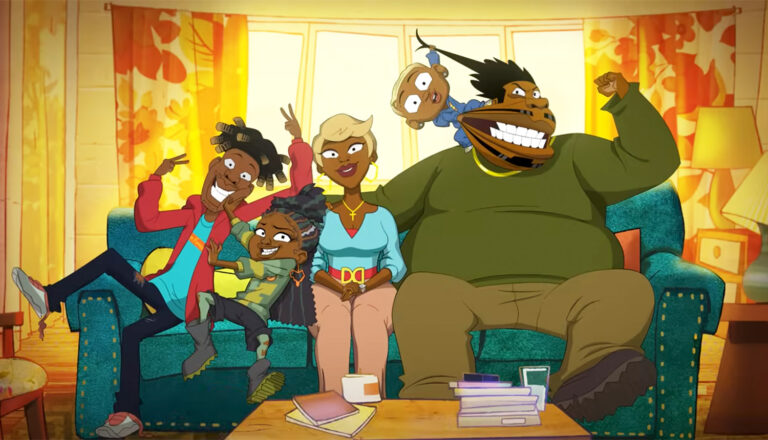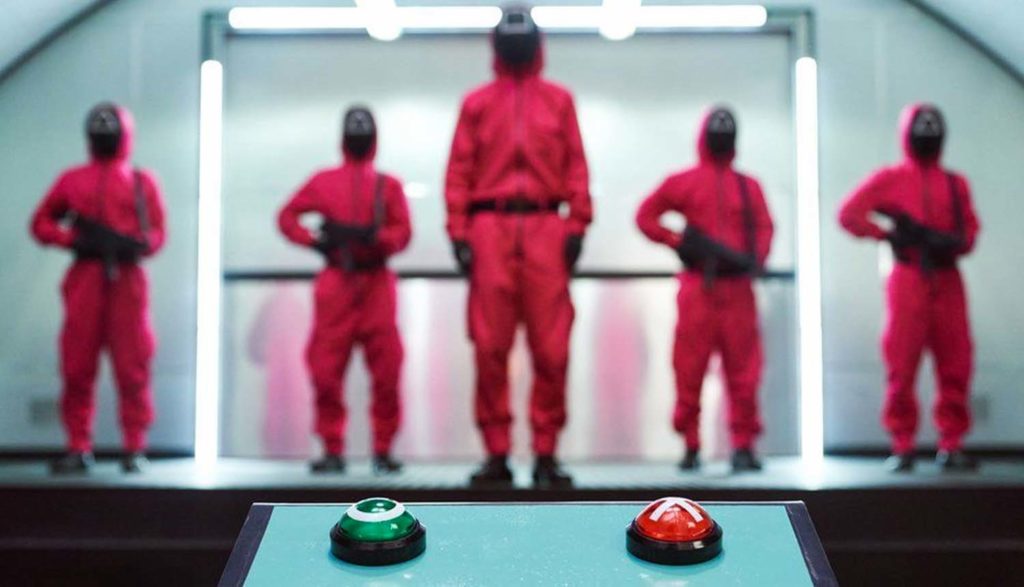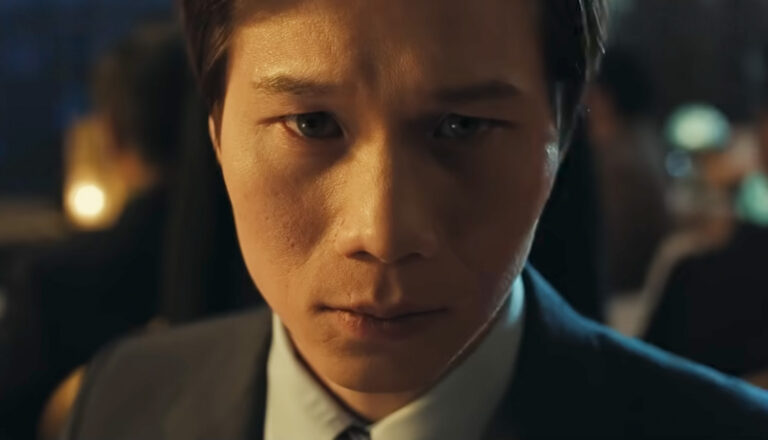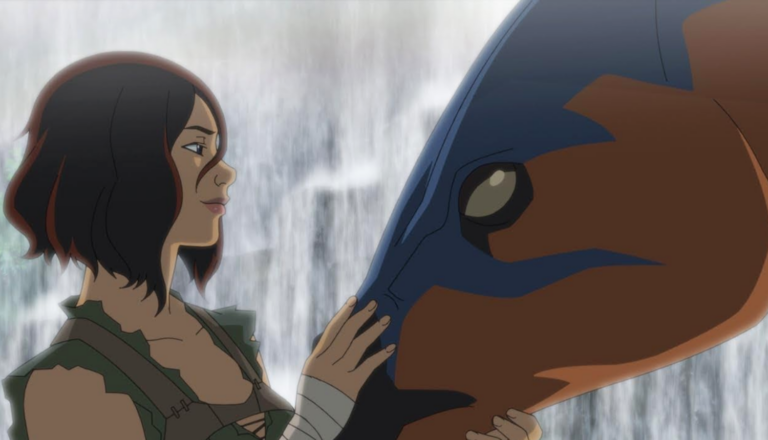
Good Times
Netflix takes a classic sitcom, Good Times, and turns it into a vulgar, violent, sexually-charged TV-MA show.

Child’s play.
That’s what folks sometimes say if they’re faced with a not-too-daunting task: a pop quiz on simple addition, or fixing a meal where everyone just wants dry cereal. Child’s play is generally something as inconsequential as a game of Candyland, as understandable as tug-of-war. Easy-peasy.
I’m not sure if the phrase child’s play is popular in South Korea. But if it is, Seong Gi-hun will never associate it with easy.
See, Gi-hun and a handful of other desperate South Koreans are playing children’s games such as tug-of-war and Red Light, Green Light. They’re playing them as if their very lives depended on winning.
And they do.
You could say that Gi-hun is a contestant on a game show with a very exclusive audience. He signed up voluntarily, hoping to pay off some astronomical debts—thus keeping his 10-year-old daughter in Korea and all of his organs in the right place.
He didn’t realize that he was competing in a contest with extraordinarily high stakes. He didn’t know that if he lost a game, he’d be killed—shot or stabbed or crushed to death. (Or that, in death, he might lose all his organs anyway.)
I should say, he didn’t realize these things the first time he signed up. When more than half of his fellow contestants were slaughtered in a brutal game of Red Light, Green Light, he realized the stakes. But when he and his fellow contestants/captives had a chance to end the game and go back to their normal, debt-ridden lives, most come back. They’re desperate. All, like Gi-hun, are willing to gamble their lives to play these children’s games and win, perhaps, a whole lot of money and new futures for themselves.
Kang Sae-byeok, meanwhile, is a North Korean defector who desperately wants to free the rest of her family. Cho Sang-woo—an investment banker and an old friend of Gi-hun’s—needs the cash to repay the clients he swindled and to clear his name in the courts. Abdul Ali is a foreign worker whose employer bilked him out of his wages; now he’s playing to feed his family. Oh Il-nam says he suffers from a brain tumor; he’d rather die playing kids’ games than suffer a long, agonizing end in bed.
They’re far from the only contestants, of course. Hundreds begin the game, only to be whittled down day by day, game by game. Fitting that they’re known as much by their numbers as their names: 218. 067. 199. 456.
That’s Gi-hun’s number, by the way—456. He was the last contestant to get in. He hopes to be the last player standing, too. He’ll be far richer, technically, if he survives. But by watching all those deaths and perhaps encouraging a few, wouldn’t he be spiritually poorer, too?
Child’s play indeed.
Netflix’s Squid Game isn’t just a TV show. It’s a global phenomenon—on target, some say, to become the streaming giant’s most-watched series ever. And, like Gi-hun himself, you could say that Squid Game is a bit of an underdog story.
It’s a South Korean product, first of all—an unlikely candidate to become Netflix’s No. 1 show in an astounding 90 countries (including the United States and Great Britain.) Yes, Korean entertainment is definitely having a moment in the Western world (what with K-pop groups filling earbuds everywhere and films such as Parasite scoring buckets of Oscars). But Netflix didn’t market the show heavily outside South Korea, which means that it’s been growing mostly through word of mouth.
Also, the show is incredibly violent, which you’d think would cut into (so to speak) the potential audience. Britain’s Daily Mail asked, “Is this the most twisted series on TV?” Writes Rebecca Onion for Slate:
This is not a show for viewers who dislike seeing people shot at close range (or stabbed, or killed by falling from a height, and so on). There are literally hundreds of such deaths in the show’s nine episodes, with a bonus dissection scene, if what you really crave is to see some intestines.
Squid Game isn’t just violent: It’s dark—as black and grim as some of its interiors are candy-colored pink and green. People lie and cheat and betray each other here, often indirectly killing folks even if they don’t actually pull the trigger. Out-of-game murder is condoned and even encouraged, too: The fewer people who get to the next round, no matter the reason, the more the winning pot grows. While we do see kindness and cooperation and even some sacrifice here, the games feed the worst instincts of its players (many of whom are, truth be told, not great people to begin with).
If the game was designed to test just how much goodness is left in humanity (as someone suggests in an episode), most of the contestants fail, and fail spectacularly.
And we haven’t even gotten to the language or nudity or suicides or the gambling or—well, surely you get the point now.
It’s funny: Shows like these are often designed to get viewers thinking about our amoral, voyeuristic society—the horrors of people watching other people die for their pleasure. And yet, couldn’t you argue that that’s what Squid Game itself does? If the game wasn’t as bloody, as horrific, would anyone watch?
Underemployed driver Seong Gi-hun needs cash in the worst way. So he steals some money from his mother’s bank account and bets it on the horses. Believe it or not, he wins. But before he can spend a single won from his winnings, it’s gone—pilfered by a clever pickpocket. Bad timing, too: Gi-hun runs into some shady characters to whom he’s in debt. The leader tells him that if Gi-hun doesn’t have his money in a month, they’ll start removing his organs. Even worse: Gi-hun doesn’t have the money to take his 10-year-old daughter out for a nice birthday dinner or give her a good present. But then, at the end of a very long day, he meets a stranger who offers an unusual opportunity.
Gi-hun mistakes the man for a Christian evangelist at first. “I don’t believe in Jesus,” Gi-hun says. “I come from a very long line of Buddhists, so find another guy to preach to.” But the man is offering something much different than eternal salvation. He wants Gi-hun to play a game with him. Every time Gi-hun wins, he’ll get 100,000 won (about $85). Every time he loses, the stranger gets to slap him.
Gi-hun is slapped dozens of times before he eventually gets 100,000 won, but the game opens up an invitation to another game—or rather series of games. When Gi-hun belatedly accepts, he’s ushered into a van in which gas is pumped in, knocking him and the other passengers out. When he arrives at an unknown location, he’s in a massive barracks with hundreds of other players—all of whom played the same game and most of whom are just as in debt as Gi-hun.
The first game on the six-game docket is Red Light, Green Light, moderated by a giant creepy robot. The contestants quickly learn that if anyone’s still moving once the robot says “red light,” they’ll be shot and killed. Literally hundreds of contestants die. We see bullets hit and blood fly, and scores of people are killed trying to claw their way out of the arena.
Violence makes an appearance elsewhere, too. Loan sharks punch and rough up Gi-hun and bloody his nose (threatening to shove a pick into his nostrils) and make him put a fingerprint on a contract in his own blood. (The chief assailant wipes some blood from Gi-hun’s face, licks it and suggests he’ll make soup with more of it if Gi-hun doesn’t pay up.) The slapping game with the stranger leaves Gi-hun’s face red and bruised. Two other contestants get into a fight in the barracks, with a man punching, kicking and pulling the hair of the victimized woman.
The woman (a pickpocket) has a history with an assailant, telling him that he “took more from me than I could possibly owe.” We learn that almost everyone in the barracks is dealing with a ridiculous amount of debt—often accumulated through gambling or other shady decisions. Gi-hun is clearly willing to steal in order to feed his own gambling habit.
Gi-hun smokes. (He initially tells his daughter that he quit, until she quite literally sniffs him out.) Someone drinks a glass of liquor as he watches hundreds of people die on a TV screen. Characters say the s-word at least 10 times. We also hear (via English dubbing) “a–,” “b–ch,” “b–tard,” “d–n” and “h—.” God’s name is paired with “d—n” four times, and we hear Jesus’ name abused once.


Paul Asay has been part of the Plugged In staff since 2007, watching and reviewing roughly 15 quintillion movies and television shows. He’s written for a number of other publications, too, including Time, The Washington Post and Christianity Today. The author of several books, Paul loves to find spirituality in unexpected places, including popular entertainment, and he loves all things superhero. His vices include James Bond films, Mountain Dew and terrible B-grade movies. He’s married, has two children and a neurotic dog, runs marathons on occasion and hopes to someday own his own tuxedo. Feel free to follow him on Twitter @AsayPaul.

Netflix takes a classic sitcom, Good Times, and turns it into a vulgar, violent, sexually-charged TV-MA show.

While its protagonist might live a nuanced life, The Sympathizer’s problematic content can’t be described the same way.

Say hola once again to the iconic explorer in this faithful reboot of the children’s series.

Based on a popular video game, Ark: The Animated Series features hungry dinosaurs, bloodthirsty people and plenty of problems.